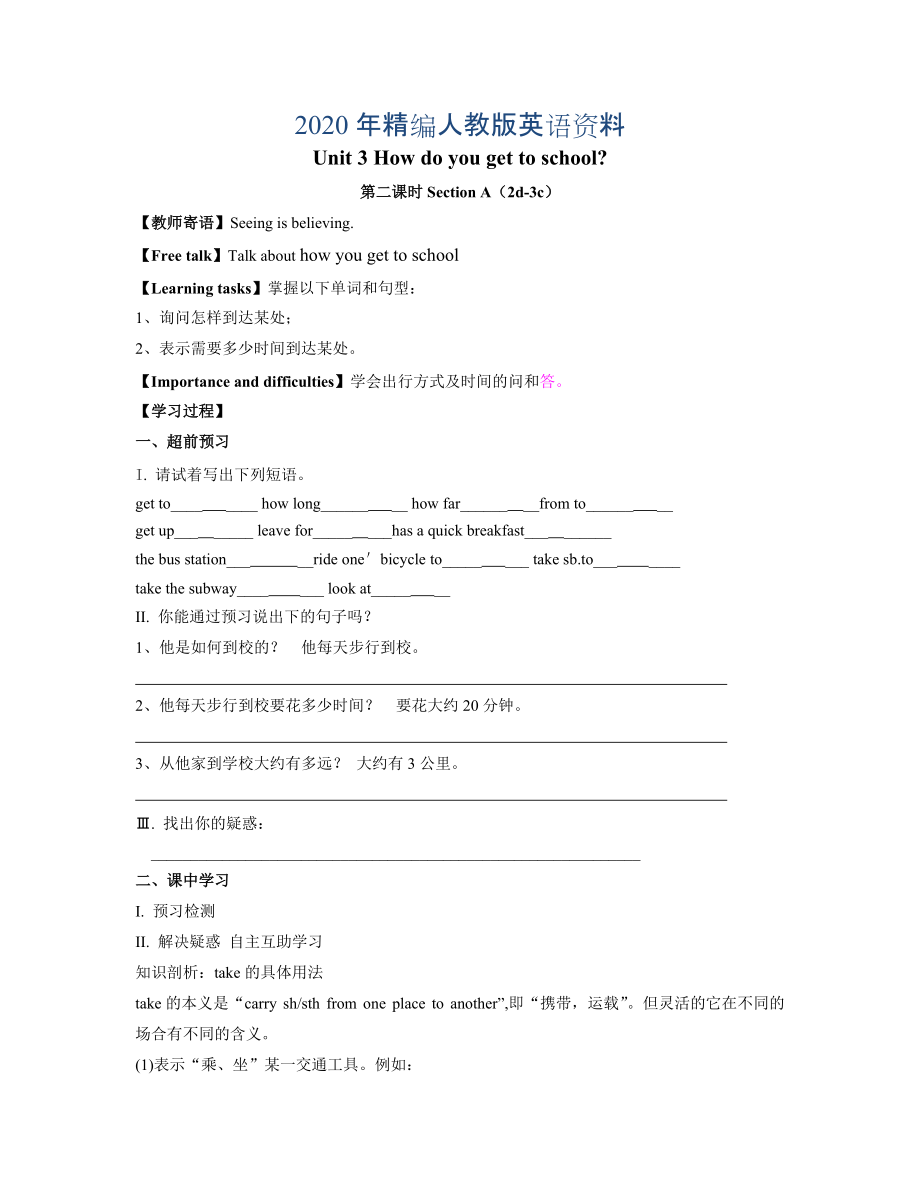《人教版七年級(jí)下冊(cè)英語(yǔ)導(dǎo)學(xué)案:Unit 3 第2課時(shí)Section A2d3c》由會(huì)員分享��,可在線閱讀��,更多相關(guān)《人教版七年級(jí)下冊(cè)英語(yǔ)導(dǎo)學(xué)案:Unit 3 第2課時(shí)Section A2d3c(5頁(yè)珍藏版)》請(qǐng)?jiān)谘b配圖網(wǎng)上搜索���。
1���、2020年精編人教版英語(yǔ)資料
Unit 3 How do you get to school?
第二課時(shí)Section A(2d-3c)
【教師寄語(yǔ)】Seeing?is?believing.
【Free talk】Talk about how you get to school
【Learning tasks】掌握以下單詞和句型:
1、詢問(wèn)怎樣到達(dá)某處��;
2��、表示需要多少時(shí)間到達(dá)某處��。
【Importance and difficulties】學(xué)會(huì)出行方式及時(shí)間的問(wèn)和答����。
【學(xué)習(xí)過(guò)程】
一、超前預(yù)習(xí)
I. 請(qǐng)?jiān)囍鴮?xiě)出下列短語(yǔ)���。
get to____ ____ h
2��、ow long______ __ how far______ __from to______ __
get up___ _____ leave for_____ ___has a quick breakfast___ ______
the bus station___ __ride one'bicycle to_____ ___ take sb.to___ ____
take the subway____ ___ look at_____ __
II. 你能通過(guò)預(yù)習(xí)說(shuō)出下的句子嗎�����?
1��、他是如何到校的���? 他每天步行到校。
3���、
2�����、他每天步行到校要花多少時(shí)間���? 要花大約20分鐘。
3�����、從他家到學(xué)校大約有多遠(yuǎn)��? 大約有3公里�����。
Ⅲ. 找出你的疑惑:
______
4、________________________________________________________
二�、課中學(xué)習(xí)
I. 預(yù)習(xí)檢測(cè)
II. 解決疑惑 自主互助學(xué)習(xí)?
知識(shí)剖析:take的具體用法
take的本義是“carry sh/sth from one place to another”,即“攜帶,運(yùn)載”����。但靈活的它在不同的場(chǎng)合有不同的含義。
(1)表示“乘�、坐”某一交通工具。例如:
My father usually takes a bus to work.我爸爸常乘公共汽車(chē)去上班�����。
注意:take和by都有“乘�����、坐”之意��。take 是一個(gè)動(dòng)詞���,后面接具體的交
5����、通工具,在表示該交通工具的名詞前一般應(yīng)有冠詞等修飾語(yǔ)�����;而by是一個(gè)介詞�����,它后面所跟的表示交通工具的名詞前一般不可用冠詞等修飾語(yǔ)���。by短語(yǔ)在句中修飾動(dòng)詞等作狀語(yǔ)。例如:
格林先生經(jīng)常乘火車(chē)去上班����。
Mr Green often goes to work by train.
Mr Green often takes a train to work.
(2) take表示“拿、取”之意�����,后常接賓語(yǔ)�,它強(qiáng)調(diào)將某人或某物從說(shuō)話地點(diǎn)帶到其他地方去。例如:Could you take my schoolbag to the classroom , please?
請(qǐng)你把我的書(shū)包拿到教室去好嗎�����?
6、
His mother often takes him to the bookshop.他媽媽經(jīng)常帶他去書(shū)店��。
注意:如果表述把某人或某物從別處帶到說(shuō)話地點(diǎn)時(shí)�����,應(yīng)用bring.例如:
Han Mei ,please bring me a cup of tea.韓梅����,請(qǐng)給我端杯茶來(lái)。
Don’t forget to bring your dictionary here next time.
下次別忘了把你的詞典帶來(lái)��。
(3) take 表示“花費(fèi)時(shí)間”之意�,其常用句型為“It takes sb some time to so sth” ,意為“某人花多少時(shí)間做某事”,注意后面的動(dòng)詞前的
7����、to不可丟掉。
例如:It takes her twenty minutes to walk to school every day.
她每天步行去上學(xué)要花二十分鐘的時(shí)間����。
It takes me half an hour to do my homework in the evening.
晚上我要花半小時(shí)做作業(yè)。
(4)含take的短語(yǔ)
take exercise 運(yùn)動(dòng)��;鍛煉 take off 脫掉�;(飛機(jī))起飛
take a look(at) 看一看 take photos 照相�����,拍照
take a seat 坐下���,坐坐
8、 take a walk 散步
take a rest 休息 take down 取下
take away 拿走 take out 拿出
重點(diǎn)難點(diǎn)釋義:??
1�����、How far 用于詢問(wèn)兩地間的距離��,答語(yǔ)要用表示兩地間的距離的詞語(yǔ)���。
例如:How far is it from Beijing to Shanghai?
About several thousand kilometers����。
在回答how far的提問(wèn)時(shí),有3種情形:(1)有具體的數(shù)字時(shí)�,應(yīng)與away from連用,表具體距離���。
(2)
9�����、可用模糊的概念回答�����,即far或near����。
(3)可用“數(shù)字+minutes’…”回答。
Eg: How far is it from the zoo to the park?
It’s about 2 kilometers.大約2公里���。
It’s very near.非常近���。
It’s about 10 minutes’ walk.步行大約10分鐘的路程。
【知識(shí)鏈接】由how構(gòu)成的常用詞組
詞組
用法
例句
how far(多遠(yuǎn))
提問(wèn)路程和距離
How far is it from your home to your school?
從你家到學(xué)校有多遠(yuǎn)��?
how
10�����、 often(多久一次)
表頻度����,意為“多長(zhǎng)
時(shí)間一次”“多久一次”
How often does your mother exercise?
你母親多久鍛煉一次��?
Three times a week. 一周三次��。
how soon(再過(guò)多久……)
常用于將來(lái)時(shí)�����,“多久以后”
How soon will he be back?
他什么時(shí)候回來(lái)�?
In two months.兩個(gè)月以后�����。
how long(多久�,多長(zhǎng))
對(duì)時(shí)間提問(wèn),“多長(zhǎng)時(shí)間”
How long does she live here?
他在那里住了多長(zhǎng)時(shí)間��?
how many (多少)
后
11�、加可數(shù)名詞
How many trees are there in front of the house ?
房子前后多少樹(shù)���?
how much (多少)
后加不可數(shù)名詞
How much milk is there in the glass����?
杯子里有多少牛奶�?
III. 學(xué)習(xí)過(guò)程:
1. 練習(xí)表演2d對(duì)話
2�、自學(xué)完成Section A 3a��,組內(nèi)檢查�����,組織表演對(duì)話����。
3、標(biāo)出重要的短語(yǔ)��、句型和疑難點(diǎn)�,準(zhǔn)備課堂中討論解決。
4�、依照3b操練目標(biāo)語(yǔ)言。
5�����、組內(nèi)或組間完成3c并結(jié)合素材進(jìn)行對(duì)話表演��。
【課堂練習(xí)】
一�、用所給詞的適當(dāng)形式填空。
1.He of
12、ten (ride ) to school, but sometimes he (walk) to school.
2. My mother always ( go ) to work by bus.
3. Tom never ( take) the train to school .
4.Yesterday I ( walk) to school .
5.How ( do ) your sister get to school ?
二��、根據(jù)要求完成句子
13�����、1. I walked to the supermarket yesterday. (同義句轉(zhuǎn)換)
I went to the supermarket yesterday.
2. Tom sometimes goes to work by taxi. (同義句轉(zhuǎn)換)
Tom sometimes to work.
3. Lucy usually goes to school by bike. (同義句轉(zhuǎn)換)
Lucy usually
14��、 to school.
4. 安通常怎樣去上學(xué)��? Ann to school?
5. 她乘坐地鐵去學(xué)校�。She to school by the .
三、短文填空�����,每空一詞��,單詞的第一個(gè)字母已經(jīng)給出����。
Jack l_______ near a little town. It is about 15 kilometers f______ his home to school. Every day, he g______ up at six o’cloc
15、k, showers, and has a quick b_______. Then he l_______ for school at around half past six. First, he rides his bike to the bus s_______. That takes about ten m_______. Then the early b______ takes him to school. The bus ride u_______ takes about 25 minutes.
【要點(diǎn)歸納】
1.學(xué)會(huì)談?wù)摻煌üぞ摺?
2.合理安排行程����,并合理選用交通工具。
16���、
【拓展練習(xí)】
一�����、選擇填空
( ? )1�����、_____??photos do you have?-Seventy-two.
??? A. How long? B. How far? C. How many? D. How often
(? )2����、_____??does it take�����?-It takes 20 minutes by bus.
A. How long? B. How far? C. How many? D. How often
(? )3����、_____??is it from your
17、home to school?-It’s two kilometers.
A. How long? B. How far? C. How many? D. How often
(? )4�、_____??do you exercise?-I exercise every day.
A. How long? B. How far? C. How many? D. How often
(? )5���、Then the early bus_____??him?_____?school.
???? A. tak
18���、es, with? B. take, of??? C. takes, from? D. takes, to
(? )6��、How far is_____??from Hangzhou to Wuhan?
???? A. that?????? B. /???????? C. this??????? D. it
二�����、翻譯詞組:
1���、多遠(yuǎn)?___________??????? 2、多長(zhǎng)時(shí)間??___________????? 3����、坐地鐵??___________?????
4、騎自行車(chē)?___________???? 5����、乘火車(chē)???___________?????? 6、到達(dá)??
19�����、??___________???
7����、起床???___________?????? 8���、快速吃早飯..???___________??? 9����、離開(kāi)去學(xué)校?????___________?
10、公共汽車(chē)站???___________???11. 距離學(xué)校10公里__________
12.在六點(diǎn)半左右____________________ 13.公交車(chē)程__________
三���、句型轉(zhuǎn)換
1�����、It takes about 10 minutes.???????_____???_____? _____ it??_____???
2�����、LinHui gets to school by bus.???????? LinHui??_____ _____ _____ to school?
3��、It’s 5 kilometers from my home to Changsha.
????????_____ _____ _____ _____???from your home to Changsha?
?4����、I often take the train to get home. (同義句)
I often get home?_____ _____??.
【總結(jié)反思】
 人教版七年級(jí)下冊(cè)英語(yǔ)導(dǎo)學(xué)案:Unit 3 第2課時(shí)Section A2d3c
人教版七年級(jí)下冊(cè)英語(yǔ)導(dǎo)學(xué)案:Unit 3 第2課時(shí)Section A2d3c

